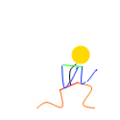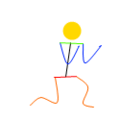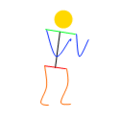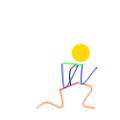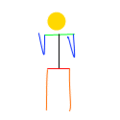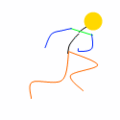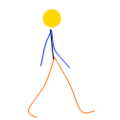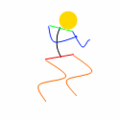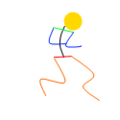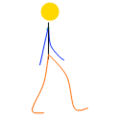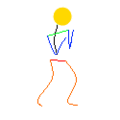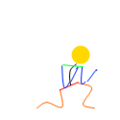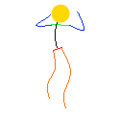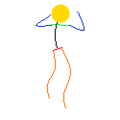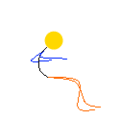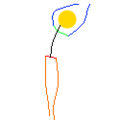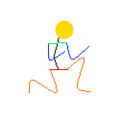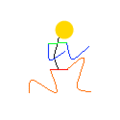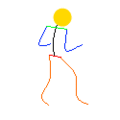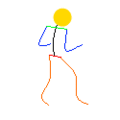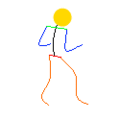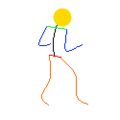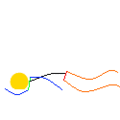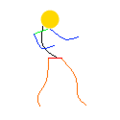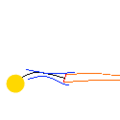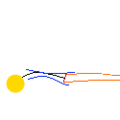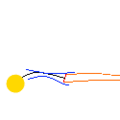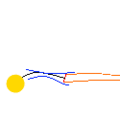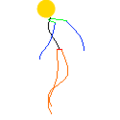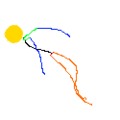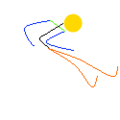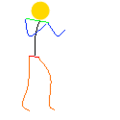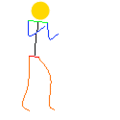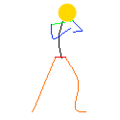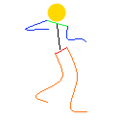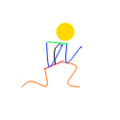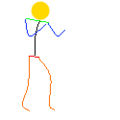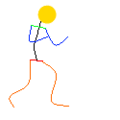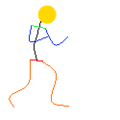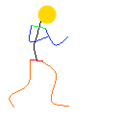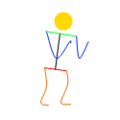This page is dedicated solely to the sample animations so quest authors know what's needed for the fighting game.
You don't need to follow these to the letter. There's no upwards limit to the amount of animations you can have, and they could be used for anything you can think of. The only limitation that you cannot go above one hundred frames per second as an animation speed. Separate animations from standing from crouch and crouching from stand? Entirely okay! Don't be afraid to come up with clever and bizarre in-character abilities, either! They're the spice that makes things unique and interesting!
To note: these are at roughly one half the size they should be in-game.
Read this first: http://www.petesqbsite.com/sections/tutorials/tuts/tsugumo/default.htm
Stationary animations
Crouching. Every character needs one. Could be a single frame if you wanted, could be twenty or more!
Goto Crouch. Highly recommended. Usually one or two frames, and the frames can be re-used in dozens of animations. Would likely save you work in the future. Works as a "preparing to jump" pose, as well.
Standing. Every character needs one. Could be three frames of the character moving slightly up and down, could be thirty of the wind blowing the character's clothes, could be a generic fisticuffs motion.
Crouching turn. Not an important animation, and would only require one extra sprite. If you're feeling lazy, don't have one.
Standing turn. Same as crouching turn, but slightly more important, and usually two frames. Ultimately skippable.
Basic locomotions
Running! If your character doesn't have a forwards hop, they'll need one of these. This is used for characters that charge into battle like Beardbeard, or are very mobile.
Walking. Every character needs one of these. They don't need to have as many frames as this; this is actually more than twice as many frames as needed.
Backhop. Unless your character is a coward or good at running away, you'll need this. Otherwise, they'll have a backwards run. To note: some frames in this will be in this character's airguard. Always look for ways to save yourself work.
Front hop. Some characters will have this, some will not. It depends on if your character would sprint forwards in battle. Beardbeard would likely have a run, while someone like Coralina would more likely have a hop.
Walking backwards. Every character needs one. Same as walk forward, but reversed and slightly slower. If you want to be awesome, you could have walk back and walk forwards similar but slightly different. If you want to be crazy awesome, you could have them be two different things entirely.
Blocking
Standing guard. This animation has an anticipation frame, where the character anticipates an attack, a block frame, where the character begins to defend against it, and a successful block frame, where the character's arms are pushed back by recoil. If you felt like being fancy, you could have the character have several anticipation frames, such as making an "oh shit" face, and put a great deal of detail on secondary motion on successful blocks. Otherwise, you could just have a single blocking frame.
Crouching block. Pretty much the same as standing block.
Airblock. Only the last three frames of this are actually the blocking animation. The rest is the jump itself.
Aerial animations
Vertical jump, and the only one you really need. This image also contains the falling sprites used for every jump animation, and used once you recover from an air knockdown. About twice as many sprites as needed.
Backwards jump, into the falling animation. Only have this animation if you want to be fancy.
Forwards jump, into the falling animation. Same as backwards jump, but played in reverse. Only have this animation if you want to be fancy.
Damaged animations
Everything in this section is about the average frames per animation.
Hit by a hard attack while crouched.
Same as above, but weak. Uses the first few frames of the above animation.
Hit by a hard attack while standing, low/medium hit.
Same as above, but weak. Uses the first few frames of the above animation.
Hit by a high hard attack while standing, or in the air. In the air, this would be followed with air knockdown frames
Same as above, but weak. Uses the first few frames of the above animation.
Getting hit by a strong attack while in the air sends you into an air knockdown state. Uses the first few frames of getting hit by a high attack, air knockdown frame, and groundslam. Groundslam shows up when you're thrown into the ground or knocked into it very hard, and is usually no more than three frames. Air knockdown would be one or two frames at max, unless you're doing a lot of fancy secondary motion.
Tripping animation. This is when a character kicks out your legs from under you. Usually just air knockdown with different game mechanics. If you're feeling up to it, it could be something entirely unique, such as a character adorably flailing before they fall over.
Recovery
Getting up from being knocked over. This will always bring you into a crouch.
When you get up from a knockdown, it's possible for the other player to land a hit on you as soon as you get up. To deal with this, many fighting games allow you to move forwards or backwards while getting up. If you have a character that flips themselves up like Ryu from street fighter, or a character that can drag themselves in a direction while they stand up, you won't need additional animations, they'll just move while doing the standard one.
It's possible to just copy and paste the moving get up animation for both directions. A roll like this could be used for other things, as well, like an ukemi or a rolling attack.
Liedown frame. Most fighting games don't have more than one sprite for this. this is when you're knocked out at the end of a match, or knocked down from a trip, or just generally tipped over like a cow.
Launched
Launched frames tend to show up fairly infrequently. All three could be a single frame rotated, or each have their own animations.
Mostly, they'll show up when a character is hit by a powerful attack from a mighty glacier, or a super move. Secondary motion is really useful on these.
Launched up. The most important, and the most common. A lot of anti-air attacks will put people in this state.
Launched at an angle. Same as launched up, but rotated 45 degrees and edited slightly. Likely the rarest of the three.
Launched backwards. Will show up a good deal of the time, mostly from super moves, and possibly a few regular ones.
Attacking animations
Draw the big, heavy, slow, powerful attacks first. You can steal parts from them for the weaker ones. Draw them in order from most dramatic to least.
butts i need a description here
uh
so these are for hurting people, nothing here is set in stone, these're just guidelines
Standard combo: No direction + weak, Forward + weak, No direction + strong, Forward + strong, either Unique or a special attack. Not everyone will have this, but this is the standard formula.
Basic attacks
More to come
No direction + weak. Basic jab, usually no more than three frames, fast, unpunishable, the start of a standard combo.
Forward + weak. A bit stronger, and farther ranged. Not very damaging, and a bit slower. The second hit of a standard combo.
No direction + strong. Since this stick is a bit leggy, I decided to make all the hard attacks into kicks. Third hit of a standard combo.
Forward + strong. A powerful kick, to knock the opponent away. Fourth hit of a standard combo.
Down + strong. A tripping kick. This only uses one unique frame, the rest are from the standup animation. Alternative fourth hit.
The standard combo animations, played one after another.
Grabbing and throwing
Grappler-style characters could have special attack inputs wired to the grab button.
Not all throws have to be throws. Some could grab the opponent and start chewing on their face, some could flip the opponent into the air followed by an attack animation, anything works.
Airgrabs would be likely be reserved for air-based characters like Demesi, agile characters like Shadran, and grapplers, unless the character has a reason to have an airgrab.
Failed grab animation. Grabs have their own key, and are risky to use from a distance. This is what plays when you miss a grab.
Successful shoulder throw, after successful grab.
Since grabs have their own buttons, they would have directional input. A direction after or during a grab send the opponent that direction, unless you feel like being fancy and having alternative grabs.
Miscellany
Dodge move. Game might not even have these, not a huge worry.
For that jerk what asked for a sprite sheet of this
See also
Quest Fighting Game
